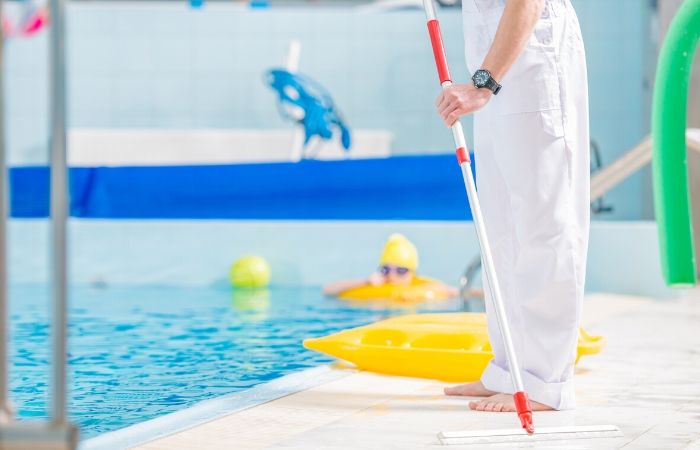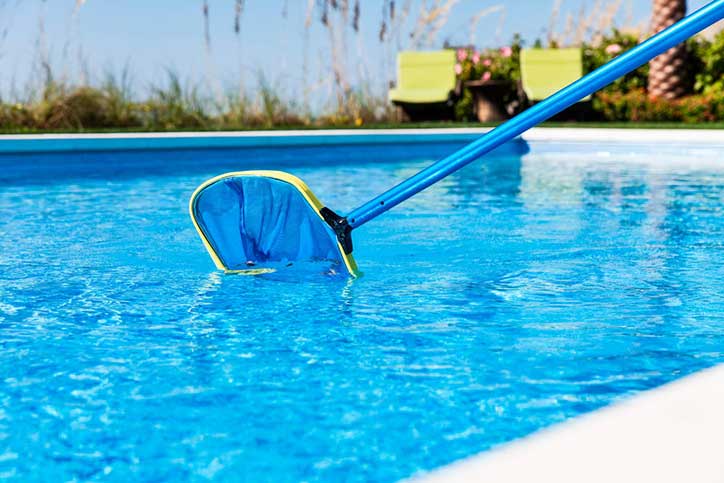Vital Pool Maintenance Tips to Maintain Your Water Sparkling Clean
Preserving an excellent swimming pool needs an organized method to water treatment and cleanliness, which ultimately adds to both the visual appeal and longevity of the pool itself. Sticking to these essential techniques not just improves the clarity of your swimming pool water yet also safeguards against prospective concerns that can rise right into costly repair work.
Examination Water Chemistry On A Regular Basis
To make certain a risk-free and satisfying swimming experience, consistently checking water chemistry is essential. Correct water equilibrium not only enhances swimmer comfort however likewise safeguards swimming pool tools and surfaces. The main chemical specifications to monitor consist of pH, chlorine levels, alkalinity, and calcium hardness.
pH degrees should be preserved between 7.2 and 7.8, as this variety decreases skin and eye inflammation while maximizing chlorine effectiveness. Chlorine degrees should preferably be in between 1-3 components per million (ppm) to provide appropriate hygiene without causing unpleasant smells or irritation. Total alkalinity, which functions as a barrier for pH, should be maintained between 80-120 ppm to support water chemistry and stop changes.

Maintain the Swimming Pool Filter Clean
Preserving correct water chemistry is only part of reliable swimming pool care; maintaining the swimming pool filter clean is just as important for optimal performance. The pool filter plays an essential duty in removing particles, dust, and impurities from the water, making certain a pleasurable and secure swimming atmosphere. In time, filters can become blocked with fragments, which can considerably reduce their performance.

Additionally, keep an eye on the stress gauge on your filter system. A pressure increase of 8-10 psi above the normal operating range normally suggests that it's time for cleansing. Disregarding to preserve a tidy filter can bring about inadequate water circulation, out of balance chemistry, and raised stress on the swimming pool pump, eventually leading to greater power costs and prospective devices failing.
Skim and Brush Often

Cleaning the pool walls and flooring is equally essential. Make use of a pool brush with a suitable bristle type for your swimming pool surface-- nylon brushes for plastic or fiberglass pools, and stainless steel for plaster or tile surfaces.
Maintain Correct Water Levels
Keeping the pool surface area clean with regular skimming and brushing considerably contributes to overall water high quality, yet preserving correct water degrees is similarly essential for ideal swimming pool health and wellness. The water level in your swimming pool must preferably be at the middle of the skimmer opening. This makes certain that your skimmer can successfully get rid of debris and drifting contaminants, preventing buildup that can endanger water clearness and top quality.
Low water degrees can lead to pump damage, as the pump might run dry, taking the chance of pricey repair services. Conversely, exceedingly high water degrees can cause water to overflow, watering down chemical equilibriums and producing an unpleasant mess. Regularly check your pool's water degree, especially after heavy rainfall or considerable dissipation due to warm.
Furthermore, think about aspects such as swimming pool usage, ecological problems, and the kind of water functions in your pool, as these can influence water levels. Installing a pool cover can aid decrease dissipation and maintain a steady level if you find yourself constantly battling rising and falling water degrees. Inevitably, regular surveillance and adjustment of water levels will help ensure a healthy swimming setting and lengthen the life of your swimming pool equipment.
Arrange Seasonal Maintenance
Recognizing the relevance of seasonal maintenance is important for guaranteeing your swimming pool continues to be in optimal problem year-round. Each period brings Pool Cleaning one-of-a-kind difficulties and problems that can impact the water quality and structural honesty of your swimming pool. By organizing upkeep tasks regularly, you can stop minor problems from intensifying right into costly repairs.
In the springtime, concentrate on opening the swimming pool, inspecting the purification system, and stabilizing the chemical levels. This establishes a strong foundation for the swimming period - Pool Inspection. As summertime methods, regular upkeep such as skimming particles, cleaning surfaces, and monitoring water levels comes to be necessary to maintain cleanliness and safety and security
As loss shows up, plan for cooler temperature levels by getting rid of fallen leaves and debris, and take into consideration winterizing your pool if it won't be utilized throughout the chillier months. This includes reducing water levels and adding winterizing chemicals to protect against freezing.
Throughout the wintertime, regular examine the pool cover and tools are necessary to make certain every little thing continues to be intact. By sticking to a seasonal maintenance routine, you can expand the life of your pool and keep it inviting and secure for usage year-round.
Conclusion
Normal swimming pool maintenance is crucial for guaranteeing water clearness and safety and security. By constantly evaluating water chemistry, maintaining the swimming pool filter in optimal problem, and carrying out routine skimming and brushing, pool owners can properly stop algae growth and various other concerns. Keeping appropriate water degrees boosts blood circulation, while sticking to a seasonal maintenance timetable assists attend to prospective troubles proactively. Carrying out these crucial techniques will certainly contribute substantially to a tidy and inviting swimming environment.
By maintaining correct water chemistry, pool owners can make certain a secure environment, lengthen equipment life, and enhance overall pleasure of their swimming pool.
Maintaining correct water chemistry is only part of efficient pool care; keeping the pool filter tidy is similarly essential for optimum performance. Use a pool brush with a suitable bristle kind for your swimming pool surface area-- nylon brushes for vinyl or fiberglass swimming pools, and stainless steel for plaster or floor tile surfaces.
Maintaining the swimming pool surface area clean via constant skimming and brushing substantially adds to general water quality, however maintaining proper water degrees is similarly essential for ideal swimming pool health and wellness.In addition, consider factors such as swimming pool usage, ecological conditions, and the type of water features in your pool, as these can affect water degrees.